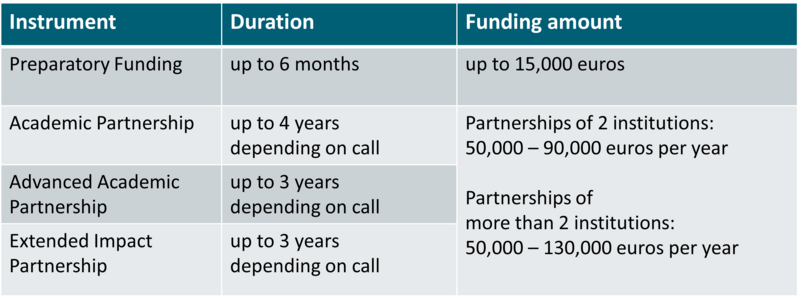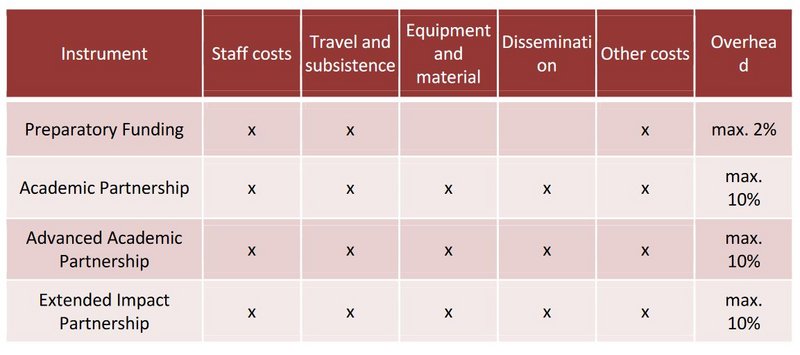General information
Objective
APPEAR contributes to achieving the Sustainable Development Goals (SDGs). The overall objective is to strengthen the scientific foundation and institutional capacities in higher education, research and management in the partner countries through academic partnerships with Austrian higher education institutions and master’s and PhD scholarships. Furthermore, APPEAR aims at increasing the commitment to international cooperation and development at Austrian higher education institutions.
APPEAR is a programme of the Austrian Development Cooperation (ADC) with the aim to realise its strategy for support of higher education and research for development on an academic institutional level. It is implemented in the ADC’s 11 priority countries and key regions, which are located in East, West and Southern Africa, in South Asia, the Middle East, the South Caucasus, and South-East Europe.
Eligible countries
- Burkina Faso, Ethiopia, Uganda, Mozambique
- Bhutan
- Palestine
- Armenia, Georgia
- Albania, Kosovo (special requirements apply) and Republic of Moldova
Thematic focus of the programme
Strengthening of institutional capacities in higher education and research for development:
- Eradicating poverty and meeting basic needs – water, sanitation, energy, food security, including a nexus approach, education for all, social protection and employment for all
- Human rights, gender equality, empowerment of women and girls, migration
- Sustainable economic development – private sector development, sustainable economy and urban development, leveraging digital technologies for development, tax systems and domestic revenues in partner countries
- Protection of the environment and sustainable management of natural resources – mitigating climate change and its impacts, protection of ecosystems, responsible use of natural resources, sustainable energy, water and sanitation
- Peace, conflict prevention, security and development, governance, humanitarian aid
Instruments
Preparatory Funding
This instrument aims at enabling new academic partnerships between Austrian higher education institutions and higher education and research institutions in the partner countries. The aim of these small-scale projects is to elaborate a joint project proposal for an APPEAR Academic Partnership.
Academic Partnership
This instrument finances deepened and sustainable academic cooperation in higher education, research and management.
Advanced Academic Partnership
This instrument is available to consortia which have successfully completed an APPEAR Academic Partnership project. It finances continued academic cooperation that builds on the results of the completed project and develops new innovative designs for cooperation in higher education and research for development.
Extended Impact Partnership
This instrument finances continued cooperation that builds on the results of a completed APPEAR project and develops new innovative designs for cooperation in the use of research results, that have already been generated. The aim of the Extended Impact Partnership is to extend the impact by focusing on the application and uptake of the achieved results. Consortia of academic institutions are encouraged to invite non-academic institutions to join and to enhance the impact. The long-term goal is to improve the living conditions of defined target groups.
All instruments contribute to the overall objective of APPEAR by strengthening the scientific foundation and institutional capacities in higher education, research and management in the partner countries and by increasing the commitment to international cooperation and development at Austrian higher education institutions. The projects financed within these instruments focus on one or more of the APPEAR thematic areas and contribute to achieving the SDGs.

Guiding principles for project design and implementation
- Participatory approach
- A concept of culturally open-minded knowledge
- Practically and empirically oriented approach
- Gender sensitivity
- Bottom-up and demand driven approach
- Leave no one behind
- Open access – open data
Added values – elements which are considered in the project selection process
- Alignment with the priorities of the ADC country strategies, use of synergies with ongoing ADC-funded projects
- Inclusion of persons with disabilities in alignment with the APPEAR diversity strategy
- Strengthening of regional networks and South-South cooperation
- Advancement of young and particularly female researchers
- Practically oriented activities that enhance the application of results, research-into-use and research uptake
- Project responsibility by an institution in the partner country
Eligible institutions
Austrian institutions:
- Only higher education institutions are eligible to participate. They can submit and coordinate the project.
Institutions in partner countries:
- Higher education institutions and research institutions are the main target group. They can submit and coordinate the project.
- Other institutions, such as research and teaching institutions, NGOs, think tanks, civil society organisations, are eligible to participate as additional partners. Private sector entities can be included but are not eligible to receive funding. Other institutions cannot submit/coordinate a project.
A project must consist of at least one Austrian higher education institution and a higher education or research institution in a partner country. Either of them can assume the role of the coordinator. Other institutions in partner countries can only be additional partners in a consortium that consists of at least one higher education institution in Austria, and one higher education or research institution in a partner country.
Associate partner institutions:
- They are located outside Austria and the 11 partner countries, but in a country listed in the OECD DAC list of ODA recipients. They comprise higher education institutions, research institutions, research and teaching institutions, NGOs, think tanks, or civil society organisations. The associate partner institution must be located on the same continent as the partner institution of the core consortium. Associate partner institutions can receive funding. However, the sum of all associate partner institutions must not exceed 30% of the overall budget. Private sector entities can be included but are not eligible to receive funding.
EU institutions:
- Higher education institutions from EU member states can be included in a project but are not eligible to receive funding.
Albania and Kosovo
For cooperation projects with Albania and Kosovo, special requirements apply. While all the instruments are available to partnerships with institutions in Kosovo and Albania, only development research projects are eligible for funding. Projects with a focus on higher education or the strengthening of management capacities is not eligible. Furthermore, projects must be aligned with the priorities of the ADC in Albania and Kosovo. The consortia must elaborate on why the project fits best into APPEAR and cannot be funded by other programmes (e.g. EU).
Master’s and PhD Scholarships
One objective of APPEAR is that higher education institutions in the eligible countries increase their number of qualified staff that is enabled to contribute to the improvement of teaching, research and management at their institutions. Students and professionals from the eligible countries complete their Master’s or PhD studies at an Austrian university. At least 70% of the scholarships should be awarded to Master’s and PhD students that are embedded in an APPEAR partnership. At least 50% of the individual scholarships will be awarded to female applicants.
There are two types of APPEAR scholarships:
- Master’s and PhD scholarships that are embedded in an ongoing APPEAR partnership.
- PhD scholarships that are individual, i.e. not embedded to an ongoing APPEAR partnership.
Requirements
- The applicant is nominated by the home institution. The institution confirms that the scholarship serves the specific demands of the institution and the development needs of the home country (e.g. within the management plan of the higher education institution) and that the applicant is employed and will be reemployed by the institution.
- If the study project (i.e. scholarship) is embedded in an ongoing APPEAR partnership, the coordinator of the partnership describes how the study project will contribute to the objective of the partnership.
- Confirmation of acceptance of the study project by a scientific supervisor at the Austrian institution hosting the scholarship
- The applicant confirms his/her intention to return to the home country after completion of the study project and to pursue an appropriate, development-related assignment.
Financed costs
- Master’s studies: 1,000 euros per month (up to 24 months)
- PhD studies: 1,100 euros per month (up to 48 months)
- Travel costs (including field studies in the home country) and additional grants (German course, participation in conferences/courses, thesis allowance)
